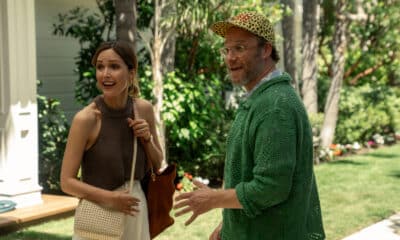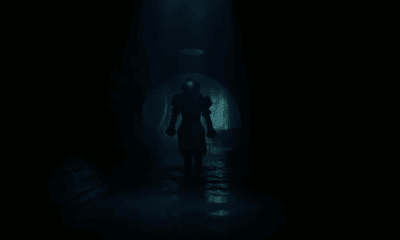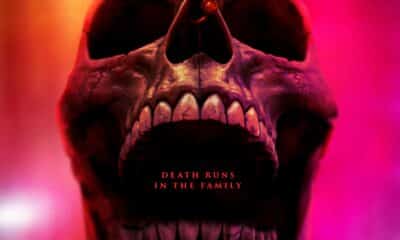
In many ways, Damien Chazelle’s new film Babylon feels like a culmination of the first phase of his career. From the musicality of his earliest directorial efforts, to La La Land’s Hollywood setting, to the ambition and scope seen through his work on the Neil Armstrong biopic First Man, it truly feels like every project he’s helmed has been building to his latest work. And by all accounts, it has, considering Chazelle has stated publicly that he’s been conceiving the story of Babylon for over a decade. With this in mind, in honour of the film’s digital release, we thought it would be interesting to cast our eyes back over his career so far.
Guy and Madeline on a Park Bench
More of an underseen indie gem than a breakout hit, Damien Chazelle’s first feature feels like an apt introduction to his identity as a filmmaker, most notably to his preoccupation with telling stories centred around music (in particular, jazz music). Guy and Madeline on a Park Bench is a musical following two former lovers, one of whom is a young jazz trumpeter (portrayed by musician Jason Palmer, himself an acclaimed trumpeter). The film was produced on a shoestring budget, and attempted to blend Chazelle’s love of old MGM musicals with a more documentary-esque, cinema verité style of filmmaking, complete with light-footed handheld camera movement and black & white cinematography. Made as a thesis project during his time studying at Harvard, watching Guy and Madeline on a Park Bench truly feels like viewing Chazelle’s work in its larval form – especially when placed alongside his later movies, this film feels singularly his.
Whiplash
The film that formally announced Chazelle as a director to watch, Whiplash is a thriller depicting the charged relationship between a young drummer (Miles Teller) at Juilliard’s famed music school, and the demanding, abusive instructor (J.K. Simmons) who mentors him. Of all of the films Chazelle has directed in his career, Whiplash is the one which most closely resembles parts of the director’s own life, as it was loosely inspired by his experience as a jazz drummer in high school.
In contrast to his previous film, there is little romance to be found in Whiplash, which is instead wracked with tension for much of its runtime. This is in no small part driven by the ferocity of Simmons’s Academy Award-winning performance, in all of its sweat drenched, insult spitting, chair hurling glory. Through exploring the nuances of the combative relationship between hardened mentor and driven pupil, the film strives to make very clear the sacrifices people consider necessary to become renowned in their chosen field – a theme Chazelle returns to multiple times throughout the rest of his career.
La La Land
If Whiplash was Hollywood’s proper introduction to Chazelle, La La Land solidified his status as one of the most prodigious talents in the film industry – he remains the youngest person ever to win the Academy Award for Best Director for his work crafting this film, an achingly sentimental musical about a young actress (Emma Stone) and jazz pianist (Ryan Gosling) falling in and out of love as they try to make their dreams come true in Los Angeles.
La La Land once again sees Chazelle continue his penchant for telling stories with music at their core, but unlike Whiplash, this is a story framed with a degree of sunny optimism, positioning Los Angeles as a fabled land of opportunity for creatives to make their mark, and soulmates to find each other. This atmosphere is created by an upbeat tone, bouncy musical numbers, and the gorgeous, instantly recognisable jewel-toned cinematography of new collaborator Linus Sandgren (now a constant fixture in Chazelle’s production team). To many, La La Land represents the curtain that Chazelle tries to peek behind in Babylon – it’s a work of art that celebrates the magic of the movies, and the place where they come to life.
First Man
Once again starring Ryan Gosling, First Man is Chazelle’s first film not featuring a musician as a central character. A loose biopic of astronaut Neil Armstrong, the film chronicles the events of the space race, from early test flights up to the eventual Apollo 11 moon landing.
Chazelle’s filmmaking is also a departure from his earlier work, with the film as a whole reflecting the more quiet register of Gosling’s performance of a closed-off Armstrong. First Man represents a stylistic evolution for Chazelle, and the film feels the most tactile of the director’s career – Chazelle and Sandgren utilise three different film formats while shooting the movie, which coupled with an emphasis on documentary-esque camera movement, brings an authentic texture to this 60s set tale that evokes footage shot during the era itself. Despite these shifts in style, the film does double down on Chazelle’s favoured theme of dedicated professionals going to extremes in ways which damage their personal lives, allowing it to still feel in conversation with his earlier work.
Babylon
Chazelle’s latest once again takes place in Hollywood, this time in the 1920s, following an ambitious cast of characters as they fight to maintain their relevance as the film industry evolves beyond the silent era.
This film feels like a turning point in Chazelle’s career – Babylon contains many signifiers of one of his films (a jazz trumpeter plays a supporting role in the story, lead characters struggling to make their mark as artists, there’s frequent deification of the idea of Hollywood), and yet this feels like by far his darkest work. Here Chazelle takes his favoured theme of the self destructive artist to its furthest end, one which condemns Hollywood as much as it romanticises its image as a famed land of opportunity. The characters of the film buy into the mythic magic of moviemaking, and through over three hours of debauchery, filth, and a lot (seriously, a LOT) of drug use, Chazelle shows how the film industry chews each of them up and spits them out. Unlike in some of his other works, the pursuit of art or a dream doesn’t bring salvation, but ruin, making Babylon feel like a closing chapter for this first part of his career. One wonders what kinds of stories he will tell next.
Babylon is available to own now on Digital, and will be available on 4K Ultra HD™, Blu-ray™, and DVD from April 3rd.

Latest Posts
-


Film Trailers
/ 2 days agoFirst trailer for Darren Aronofsky’s ‘Caught Stealing’
Sony Pictures has released the debut trailer for Darren Aronofsky’s new film Caught Stealing,...
By Paul Heath -


Film Reviews
/ 3 days ago‘Lilo and Stitch’ review: Dir. Dean Fleischer Camp (2025)
Director Dean Fleischer Camp won audiences over with the fantastic Marcel the Shell with...
By Kat Hughes -


Apple TV
/ 3 days agoApple TV+ debuts first look at new season of ‘Platonic’ with Seth Rogen and Rose Byrne
Apple TV+ has landed a first look at the second season of Platonic, the...
By Paul Heath -


Television
/ 3 days agoTrailer for HBO Max prequel series ‘IT: Welcome to Derry’
A teaser trailer has landed for HBO Max’s IT: Welcome to Derry which will...
By Paul Heath




